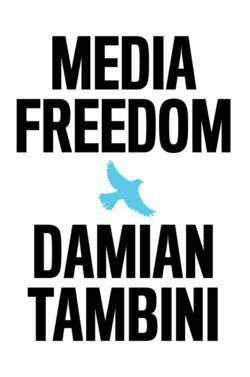Media Freedom

Реклама. ООО «ЛитРес», ИНН: 7719571260.
Оглавление
Damian Tambini. Media Freedom
CONTENTS
Guide
Pages
Dedication
Media Freedom
Acknowledgements
Abbreviations
Introduction
1 Media Freedom: Unresolved Tensions. Introduction: Media Freedom and Global Governance
Why Protect Media Freedom?
Is Media Freedom Absolute?
What Are Media?
Freedom From or Freedom To?
Freedom from the State or from Private Actors?
‘Noise Reduction’ or Censorship?
Is Self-Regulation Voluntary?
Information Sovereignty versus ‘Regardless of Frontiers’?
How to Regulate Media Power?
Institution Building or a Slippery Slope?
Tech Giants or Free Media?
Global Standards or American Exceptionalism?
Media Policy Stasis: Why Theoretical Confusion Matters
Dynamics of Change
The Approach of This Book
Notes
2 Constructing Press Freedom
Theory and the ‘Fourth Estate’
The Captive Press
Press Freedom and the American Revolution
Constitutionalizing Press Freedom
Institutionalization: From Licensing to Liability and Social Responsibility
Distribution, Copyright and ‘Taxes on Knowledge’
International Human Rights and American Exceptionalism
The Impact of Article 10 ECHR on Journalistic Privilege in Europe
Press Freedom, ‘Journalism Privilege’ and the Post-War Compact
Political Economy: Monopoly, Tax, Distribution
An Audit of Press Privilege
Press Freedom: Conditional on Duties?
Conclusions. Press Freedom and the Fourth Estate: Thousands of Choices
Notes
3 Broadcasting Freedom. Introduction: The Socio-Legal Construction of Broadcasting
A Spectrum of Approaches
Towards a Broadcasting Market: The Coase Challenge
The ‘Spectrum for Service’ Compact
Fundamental Rights and Broadcasting
The Rise and Fall of Public Service Broadcasting
What is Broadcasting Freedom?
Conclusions
Notes
4 ‘Internet Freedom’ Introduction: What Is the Internet?
The Internet as a Layer Cake
Making the Internet: Access, Interconnection, Net Neutrality and the Data Economy
Absolute Freedom on the Net: A Very Brief History
The First Settlement for Internet Content and Liability
The Clinton Paradox: Internet Freedom as a Policy Objective
Eight Ways to Censor the Net
1 Content Host Takedown
2 Search-Based Filtering
3 Domain Names, Registries, ICANN and TLDs
4 ISP Filtering
5 Graduated Response: Release of Consumer Data and Internet Suspension
6 Hash Databases
7 DDoS and Malicious Code
8 Kill Switches and Internet Shutdowns
The Emergence of Pseudo-Media on the Internet: The Search for an Analogy
Building Responsibility, or Censorship by the Blob?
Conclusions
Notes
5 A Theory of Media Freedom. Introduction: A Positive and Negative Approach
Who Should Be Free? Defining the Media
Free From Whom?
Freedom To Do What?
Outline of the Theory: Reconciling Negative and Positive Approaches to Press, Broadcasting and the Early Internet
Conclusion
Notes
6 The New Social Contract. Trumpeting Free Speech
The Impasse
The First Settlement for Media Freedom on the Internet
Surveillance Democracy and AI
Jurisdiction
Content Liability
Will ‘Content Neutrality’ Kill Journalism?
Media Freedom on the Internet: Policy Principles
The Role of International Law and Human Rights
Fiscal Policy
Public Service
Antitrust and the New Social Contract
Copyright and News Revenue
Names, Numbers, Resources, Standards
Constructing the Social Contract
How to Manage Reform?
Conclusions: Recreating Common Ground
Notes
References
Statutes, bills and directives
Cases
Index
A
B
C
D
E
F
G
H
I
J
K
L
M
N
O
P
R
S
T
U
V
W
X
Y
Z
POLITY END USER LICENSE AGREEMENT
Отрывок из книги
To Helen
Many identify the roots of our democratic tribulations in a crisis in our media: citizens have lost trust in common facts and authoritative voices, which are drowned out by the noise and distraction of the internet. Democratic self-confidence has evaporated as populists both within and outside democracies seek to control media, and construct new tools of targeted propaganda.
.....
Since the emergence of significant intermediaries with power to decide which messages are widely received, such as search and social media platforms in the first decade of the twenty-first century, states have been keen to delegate to those platforms various regulatory or censorship functions, with the result that there has been an expansion of private enforcement of censorship.69 From the point of view of a negative rights approach where state restraint on communication is the chief concern, this enables states to achieve policy objectives – such as child protection or the removal of terrorist content – because private enforcers are not in general constrained by free speech rights.
From the point of view of the individual autonomy and expressive rights of the speaker, however, it may be irrelevant whether a censorship function is carried out by a private or a state actor. What matters is whether their voice is heard. But the development in 2021 of proposals for new regulatory agencies to ensure that private actors censor speech more effectively raises fundamental questions of where the boundary between state and self-regulation is deemed to lie.
.....